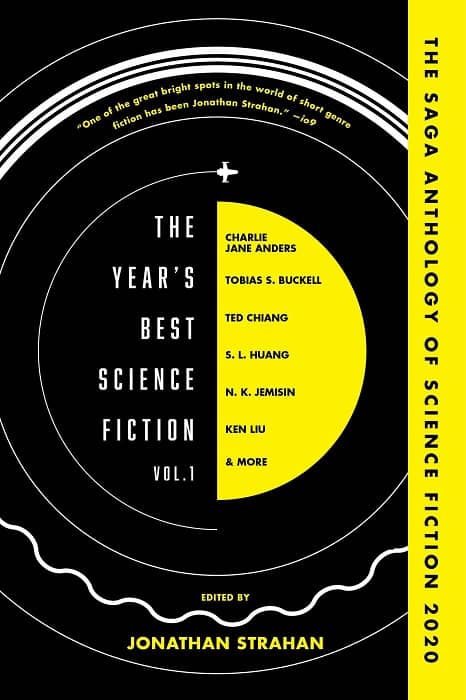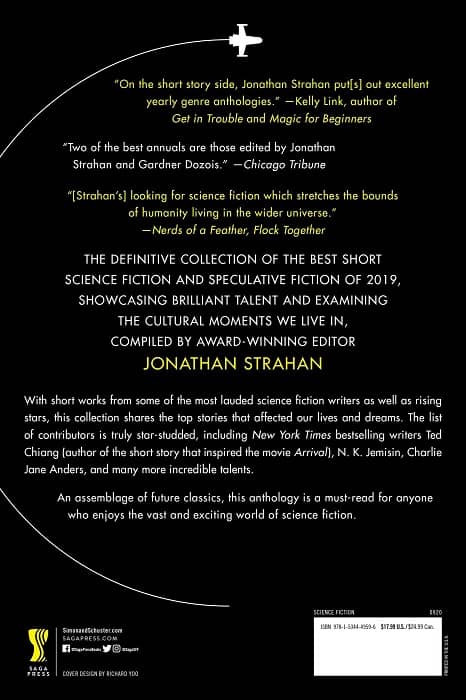Future Treasures: The Year’s Best Science Fiction Vol. 1: The Saga Anthology of Science Fiction 2020 edited by Jonathan Strahan
 |
 |
Cover design by Richard Yoo (click to embiggen)
Jonathan Strahan’s The Year’s Best Science Fiction Vol. 1 feels like a beginning. Probably because it is a beginning, in more ways than one. Jonathan has been editing Year’s Best books since 2003, and he curated thirteen volumes of the excellent Best Science Fiction and Fantasy of the Year, the first seven with Night Shade (2007-2013) and the last six with Solaris (2014-19). He’s now switched publishers to Saga Press/Gallery Books, and with that transformation comes other changes as well.
Most obvious is a switch in title, to The Year’s Best Science Fiction Vol. 1: The Saga Anthology of Science Fiction 2020, a reset in the numbering scheme (back to #1), and a refocus (dropping fantasy altogether). But the most interesting alteration (to me, anyway) is foreshadowed by the touching dedication:
In memory of my dear friend Gardner Dozois (1947-2018), who would have loved these stories.
With the title change, it seems to me that Jonathan assumes the mantle of Dozios (who edited 35 volumes of his own The Year’s Best Science Fiction between 1984-2018), and the duties and responsibilities that go with it. For example, Gardner’s introductions to his volumes were legendary, an annual summation of the Year in Science Fiction that fans looked forward to and read with relish. Jonathan’s summations have always been more modest — his intro to last year’s edition was a humble 8 pages — but with this one, titled A New Beginning, Jonathan stretches his legs admirably. His introduction to The Year’s Best Science Fiction Vol. 1 clocks in at 23 pages, room to weigh in not just on the best stories of the year, but the finest novels, collections, anthologies, magazines, and nonfiction, and well as report on rumblings in publishing, deaths in the field, award news, and more. Jonathan is a natural at this kind of opinionated writing, and he nails it.
Here’s an excerpt from the opening paragraph:
So as we move into 2020 it seems right to take stock. One fifth of the century is done, after all, and launching a new series of year’s best science fiction anthologies, The Year’s Best Science Fiction (with a respectful and affectionate nod to my old friend and mentor Gardner Dozois) seems an appropriate thing to do. This isn’t the first time I’ve had the chance to do this, but this time feels special, different. After all, we’re living in the future. Orwell’s 1984 is a distant memory, Prince’s promised 1999 party is decades ago, Clarke’s 2001 is almost as old, and even the far-future 2019 of Ridley Scott’s Blade Runner is now in the past.
He’s not wrong about that — virtually all of the mile markers I used as a young SF reader to chart out the course of the near future are now firmly in the past. That’s a little disorienting, to say the least. We’re stranded in the future without any guideposts, and it’s time to turn to science fiction quick to get some new ones.
The Year’s Best Science Fiction Vol. 1 contains 569 pages of top-notch SF from Charlie Jane Anders, Tobias S. Buckell, Indrapramit Das, Suzanne Palmer, Karin Tidbeck, Malka Older, Greg Egan, E. Lily Yu, Ken Liu, N.K. Jemisin, Caroline M. Yoachim, Fran Wilde, Ted Chiang, Rich Larson, Peter Watts, Alec Nevala‑Lee, Vandana Singh, Fonda Lee, and many others.
As expected, the usual review sites praised different stories. Here’s a sample from the Kirkus review (which headlined with, “If this is the future of science fiction, the genre is in very good hands.”)
Noteworthy stories from all over the globe are featured prominently in this collection, including Indian writer Indrapramit Das’ dark “Kali_Na,” which chronicles the unforeseen consequences of a megacorp developing an AI deity for the masses; Saleem Haddad’s “Song of the Birds,” about a 14-year-old girl living in Gaza City struggling to understand her brother’s inexplicable suicide; and Chinese writer Han Song’s metaphorical “Submarines,” in which the poor are forced to live in homemade habitats underwater. Peter Watt’s “Cyclopterus” — set in a near future ravaged by environmental collapse — is chillingly plausible, as is “Thoughts and Prayers” by Ken Liu, which chronicles a couple’s ordeal after their daughter is killed at a music festival by a shooter and their lives are destroyed by online trolls…. In an anthology full of powerful stories, perhaps the most memorable is “Emergency Skin” by N.K. Jemisin, about an explorer who returns to an Earth that his misogynist, racist, and elitist ancestors left generations earlier as it was dying — only to find not a barren, graveyard planet, as he expected, but one thriving and vastly advanced. In a sentence that exemplifies the tone of many of the anthology’s selections, Jemisin writes: “Sometimes that’s all it takes to save a world, you see. A new vision. A new way of thinking, appearing at just the right time.”
And here’s an excerpt from the Publishers Weekly notice.
Climate change looms large in many of these pieces: the clientele of “The Bookstore at the End of America” by Charlie Jane Anders, the resource hunters in Peter Watts’s “Cyclopterus,” and the loyal science bots of Alec Nevala-Lee’s “At the Fall” all navigate near-future worlds ravaged by global warming. E. Lily Yu’s “Green Glass: A Love Story,” Rich Larson’s “Contagion’s Even at the House Noctambulous,” and “It’s 2059 and the Rich Kids Are Still Winning” by Ted Chiang, meanwhile, take scathing looks at all-too-possible dystopian worlds split between haves and have-nots. Tobias S. Buckell’s “The Galactic Tourist Industrial Complex” and Sofia Rhei’s “Secret Stories of Doors” both find dark humor in very different visions of the future. There are no misfires here, and the standouts include N.K. Jemisin’s twisty “Emergency Skin,” Suzanne Palmer’s bleakly elegiac “The Painter of Trees,” S.L. Huang’s haunting “As the Last I May Know,” and Tegan Moore’s fierce “The Work of Wolves.” Strahan’s thoughtful selections offer a sometimes chilling, always fascinating look at the best of the genre.
Here’s the complete Table of Contents.
“The Bookstore at the End of America,” Charlie Jane Anders (A People’s Future of the United States: Speculative Fiction from 25 Extraordinary Writers)
“The Galactic Tourist Industrial Complex,” Tobias S. Buckell (New Suns: Original Speculative Fiction by People of Color)
“Kali_Na,” by Indrapramit Das (The Mythic Dream)
“Song of the Birds,” Saleem Haddad (Palestine + 100: Stories from a Century After the Nakba)
“The Painter of Trees,” Suzanne Palmer (Clarkesworld, May 2019)
“The Last Voyage of Skidbladnir,” Karin Tidbeck (Tor.com, 14 Jan 2019)
“Sturdy Lanterns and Ladders,” Malka Older (Current Futures: A Sci-Fi Ocean Anthology)
“It’s 2059, and the Rich Kids Are Still Winning” by Ted Chiang (The New York Times, May 27 2019)
“Contagion’s Eve at the House Noctambulous,” Rich Larson (Fantasy & Science Fiction, Mar/Apr 2019)
“Submarines,” Han Song (Broken Stars: Contemporary Chinese Science Fiction in Translation)
“As the Last I May Know,” S.L. Huang (Tor.com, 23 Oct 2019)
“A Catalog of Storms,” by Fran Wilde (Uncanny Magazine, January 2019)
“The Robots of Eden,” Anil Menon (New Suns: Original Speculative Fiction by People of Color)
“Now Wait for This Week,” Alice Sola Kim (A People’s Future of the United States: Speculative Fiction from 25 Extraordinary Writers)
“Cyclopterus,” Peter Watts (Mission Critical)
“Dune Song,” Suyi Davies Okungbowa (Apex Magazine, Issue 120)
“The Work of Wolves,” Tegan Moore (Asimov’s Science Fiction, Jul/Aug 2019)
“The Archronology of Love,” by Caroline M. Yoachim (Lightspeed, April 2019)
“Soft Edges,” Elizabeth Bear (Current Futures: A Sci-Fi Ocean Anthology)
“Emergency Skin,” by N.K. Jemisin (Forward: Amazon Original Stories, September 2019)
“Thoughts and Prayers,” by Ken Liu (Slate: Future Tense, January 2019)
“At the Fall,” Alec Nevala‑Lee (Analog Science Fiction and Fact, May/June 2019)
“Reunion,” Vandana Singh (The Gollancz Book of South Asian Science Fiction)
“Green Glass: A Love Story,” E. Lily Yu (If This Goes On)
“Secret Stories of Doors,” Sofía Rhei (Everything is Made of Letters)
“This is Not the Way Home,” Greg Egan (Mission Critical)
“What the Dead Man Said,” Chinelo Onwualu (Future Tense, 24 Aug 2019)
“I (28M) created a deepfake girlfriend and now my parents think we’re getting married,” by Fonda Lee (MIT Technology Review, 2019)
The Year’s Best Science Fiction Vol. 1 will be published by Saga Press/Gallery Books on September 8, 2020. It is 604 pages, priced at $17.99 in trade paperback and $11.99 in digital formats. The cover was designed by Richard Yoo.
See all our recent coverage of the best upcoming SF and fantasy here.
No hardcover. That’s too bad for those who wish to collect (amass?) the set over time.
Good point — I hadn’t realized there was no hardcover.
I don’t think his earlier Night Shade/Solaris editions had a hardcover either. But it does make it harder to position this as a successor to the Dozois volumes, if it’s not getting into libraries.